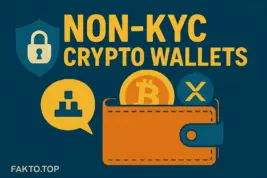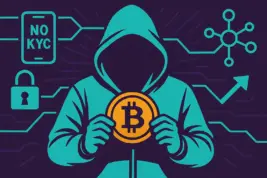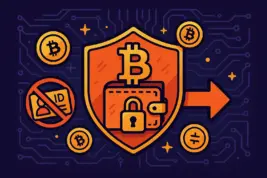Crypto Wallets Without KYC: Safe, Fast & Anonymous Options in 2025
No ID. Just Crypto. Freedom
Anonymous, Fast, Yours: The Rise of Non-KYC Wallets
Forget waiting days for identity checks or uploading awkward selfies to access your own crypto. In 2025, the rise of non-KYC wallets is flipping the script. These tools let you move fast, stay anonymous, and actually own your assets—without asking for permission. Whether you’re a privacy purist, a DeFi explorer, or just tired of centralized choke points, non-KYC wallets offer a frictionless way to transact on your terms. No gatekeepers, no paperwork, no drama. Just you, your keys, and the blockchain. This article dives into the best options out there, how they work, and why they’re becoming the go-to choice for crypto users who value speed, sovereignty, and stealth. Ready to go off-grid? Let’s unpack the wallets that don’t ask questions.

Why KYC-Free Wallets Are Exploding in Popularity
Let’s be real: nobody likes handing over their ID to a faceless exchange just to move a few satoshis. In 2025, the crypto crowd is done playing by TradFi rules. With surveillance tightening and centralized platforms turning into digital border patrol, users are shifting toward wallets that say: “No KYC, no problem.”
Non-KYC wallets are booming because they offer what crypto was always meant to deliver—freedom, speed, and privacy. Whether you’re a DeFi degen, NFT flipper, or just someone who doesn’t want their crypto tied to a government-issued identity, these wallets are your ticket to the underground economy of the future.
And it’s not just about anonymity. These wallets are faster to onboard, often open-source, and built with decentralization at their core. No middlemen, no gatekeepers, no “we’re reviewing your documents” emails. Just pure, unfiltered access to your assets.
Top Non-KYC Wallets You Should Try
Ready to go rogue? Here’s a curated list of the most trusted wallets that let you stay anonymous while keeping your crypto secure. These aren’t sketchy apps from the dark web—they’re legit tools used by privacy advocates, developers, and crypto OGs worldwide.
Some are mobile-first, others desktop-native. Some support Lightning, others are built for multi-chain DeFi. But they all have one thing in common: zero KYC. That means no ID checks, no selfies, and no third-party snooping. Just you, your keys, and the blockchain.
| Wallet Name | Platform | Supported Chains | Built-in Swap | Privacy Features |
|---|---|---|---|---|
| Samourai Wallet | Mobile (Android) | Bitcoin | No | Tor, Whirlpool, Stonewall |
| Unstoppable Wallet | Mobile (iOS/Android) | BTC, ETH, BNB, more | Yes | No KYC, open-source |
| Wasabi Wallet | Desktop | Bitcoin | No | CoinJoin, Tor integration |
| Phoenix Wallet | Mobile | Bitcoin Lightning | No | Self-custody, no KYC |
| Electrum | Desktop/Mobile | Bitcoin | No | Custom servers, privacy plugins |
How to Stay Safe Without KYC
Just because you’re anonymous doesn’t mean you should be reckless. Using non-KYC wallets requires a bit of crypto street smarts. First rule: protect your seed phrase like it’s the last slice of pizza at a hacker meetup. No screenshots, no cloud backups, no “I’ll remember it later” nonsense.

Second, always verify the wallet’s source—download only from official sites or GitHub repos. Third, consider using a VPN or Tor when transacting, especially if you’re dealing with privacy coins or bridging assets across chains. And finally, keep your software updated. Bugs get patched, exploits get fixed, and staying current keeps you ahead of the curve.
Remember: decentralization doesn’t mean chaos. It means control. And with great control comes great responsibility (yes, we went full Spider-Man).
Privacy Coins + Non-KYC Wallets = Power Combo
If wallets are the vault, privacy coins are the gold. Pairing non-KYC wallets with assets like Monero (XMR), Zcash (ZEC), or even newer stealth tokens like DERO or Firo creates a full-stack privacy setup. These coins are designed to obfuscate transaction data, sender/receiver info, and balances—making them ideal for users who want to fly under the radar.
Some wallets are optimized for these coins, offering native support for stealth addresses, ring signatures, and zero-knowledge proofs. Others let you integrate privacy protocols manually. Either way, the synergy between anonymous wallets and privacy coins is undeniable—and in 2025, it’s more relevant than ever.
| Privacy Coin | Wallet Compatibility | Privacy Tech | Use Case |
|---|---|---|---|
| Monero (XMR) | Samourai, Cake Wallet | RingCT, stealth addresses | Private payments |
| Zcash (ZEC) | Unstoppable, ZecWallet | zk-SNARKs | Shielded transactions |
| Firo | Firo Wallet | Lelantus protocol | Anonymous transfers |
| DERO | CLI Wallet | Homomorphic encryption | Private smart contracts |
Trends in Anonymous Crypto Usage
The rise of non-KYC wallets is part of a bigger wave: the decentralization of identity. In 2025, users are ditching centralized platforms not just for privacy, but for speed, flexibility, and ideology. The crypto-native generation doesn’t want to be tracked—they want to transact freely.
We’re seeing a surge in:
– Peer-to-peer marketplaces using non-KYC wallets
– NFT platforms allowing anonymous minting
– DAOs paying contributors via stealth wallets
– Privacy-first DeFi protocols with zero onboarding friction
This isn’t fringe anymore. It’s the new normal. And as more users demand control over their data, wallets that respect anonymity will dominate the next cycle.
Who Uses Non-KYC Wallets (And Why)
It’s not just hackers and cypherpunks. Today’s non-KYC wallet users include:
– Freelancers in high-risk jurisdictions
– Activists and journalists
– Crypto traders avoiding centralized choke points
– NFT creators who value pseudonymity
– Everyday users who just want to move crypto without friction
The motivations vary—some want privacy, others want speed, and many just want to avoid the bureaucratic nightmare of KYC. But the common thread is clear: control. These users want to own their assets, their identity, and their experience.

Final Thoughts & Recommendations
If you’re tired of waiting days for account approval, uploading selfies, and praying your exchange doesn’t freeze your funds—non-KYC wallets are your escape hatch. They’re fast, secure, and built for the decentralized future.
But don’t go in blind. Choose wallets with strong reputations, open-source code, and active development. Pair them with privacy coins if you want full stealth mode. And always, always back up your seed phrase like your crypto life depends on it—because it does.
In 2025, privacy isn’t a luxury. It’s a necessity. And non-KYC wallets are leading the charge.
Bonus: Experimental Wallets Worth Watching
Want to go deeper? Here are some bleeding-edge wallets pushing the boundaries of privacy and UX:
| Wallet | Tech Stack | Unique Feature |
|---|---|---|
| Samourai Wallet | Android, Bitcoin Core, Tor | Whirlpool mixing + Stonewall transactions |
| Unstoppable Wallet | iOS/Android, Swift/Kotlin, open-source | Multi-chain support with built-in swap |
| Wasabi Wallet | Desktop (Windows/Linux/macOS), .NET, Tor | Automatic CoinJoin for BTC privacy |
| Phoenix Wallet | Android/iOS, Lightning Network, gRPC | Self-custodial Lightning payments with no setup |
| Electrum | Python, Qt GUI, SPV protocol | Custom server selection + plugin ecosystem |
What Is a Non-KYC Crypto Wallet?
A non-KYC crypto wallet is exactly what it sounds like: a wallet that doesn’t require Know Your Customer (KYC) verification to use. No ID scans, no selfies, no utility bills. These wallets let you send, receive, and store crypto without revealing your identity to any centralized authority. They’re typically non-custodial, meaning you hold your own private keys—and that’s a big deal in a world where centralized platforms can freeze your funds with a single click.
Non-KYC wallets are built for speed, privacy, and sovereignty. They’re popular among users who value decentralization, live in regions with strict financial controls, or simply don’t want their crypto tied to their real-world identity. While they don’t offer fiat onramps or bank integrations, they shine when it comes to peer-to-peer transactions, privacy coins, and DeFi access.
According to CoinDesk’s guide on KYC, the rise of non-KYC tools reflects a growing tension between regulatory compliance and crypto’s original ethos of permissionless finance. As governments push harder for surveillance, users are pushing back—with wallets that don’t ask questions. It’s not about hiding; it’s about choosing who gets access to your data. And in 2025, that choice matters more than ever.
Are Non-KYC Wallets Legal?
Short answer: yes, but it depends on where you live and how you use them. Non-KYC wallets themselves are just software—tools that let you interact with blockchains. They don’t process fiat, they don’t hold your funds, and they don’t operate as financial institutions. That means in most jurisdictions, simply downloading and using a non-KYC wallet is perfectly legal.
However, things get murky when you start mixing privacy with volume. Some countries (like the U.S., UK, and parts of the EU) have introduced regulations targeting “unhosted wallets” and “anonymous transactions,” especially when linked to money laundering or terrorism financing. But enforcement is tricky, and most laws still focus on exchanges and custodial services—not the wallets themselves.
According to Chainalysis, regulators are increasingly concerned about wallets that allow users to bypass KYC entirely. But the crypto community argues that privacy is a right, not a crime. As long as you’re not using these wallets for illicit activity, you’re in the clear. Still, it’s smart to stay informed about your local laws—especially if you’re moving large amounts or interacting with regulated platforms.
Decentralized. Undoxxed. Unchained
Disclaimer / No Liability
We are not financial advisors and assume no responsibility for any decisions you make.
Cryptocurrencies are highly volatile and risky. You may lose all invested capital.
Always do your own research (DYOR) and consult qualified professionals before making any financial or legal decisions.
We make no guarantees regarding the accuracy, completeness, or reliability of the information provided.
References to third-party services or projects do not imply endorsement.
By using this site, you agree that all actions are at your own risk and you release the site owners and authors from any liability.
